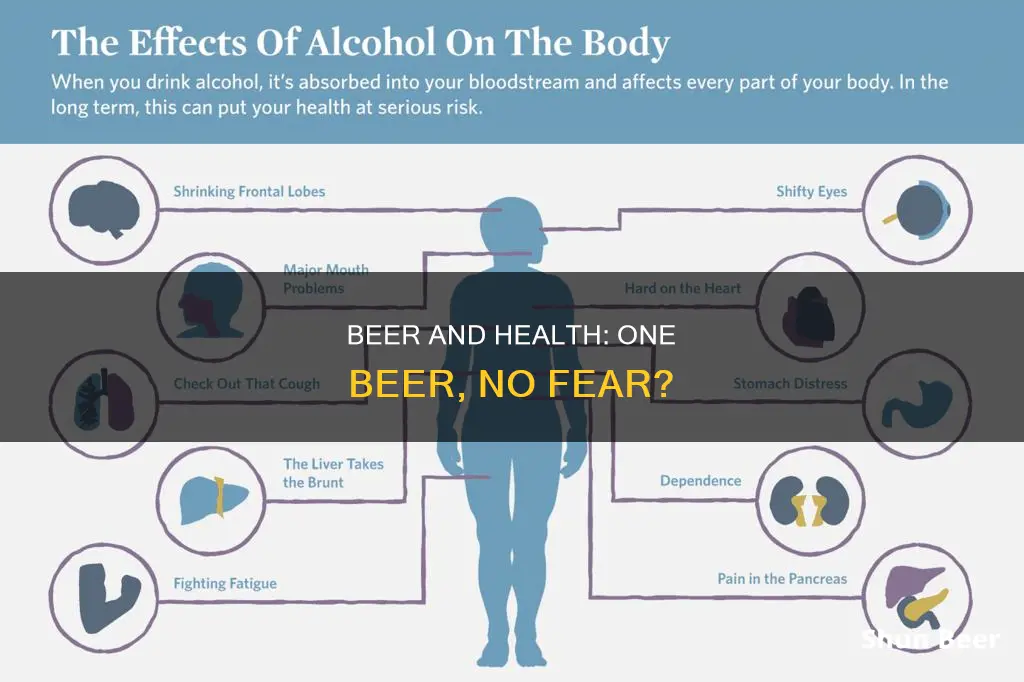
Beer is a popular alcoholic beverage with a long history of human consumption. Drinking one beer a day has been linked to several health effects, both positive and negative.
Potential benefits include improved heart health, better blood sugar control, stronger bones, and reduced dementia risk. However, heavy and binge drinking negate these potential benefits and are associated with an increased risk of early death, alcohol dependence, depression, liver disease, weight gain, and cancers.
It is important to note that the health effects of drinking beer are mixed, and while small amounts may have some benefits, excessive consumption is linked to various harmful side effects.
| Characteristics | Values |
|---|---|
| Positive effects | Positive effects on the heart, bones, blood sugars, and dementia risk |
| Negative effects | Increased risk of many health issues, including depression, weight gain, liver disease, early death, cancer, stroke, cardiomyopathy, and cardiovascular events |
| Recommended intake | No more than one standard drink per day for women and two for men |

Cardiovascular health
Drinking one beer a day may have some benefits for cardiovascular health. However, the evidence is mixed, and heavy drinking is associated with an increased risk of cardiovascular disease.
Positive Effects of Drinking One Beer a Day
Some studies have found that drinking one beer a day may have a positive impact on cardiovascular health. A 2020 review article concluded that people who consume beer in moderate amounts have higher levels of "good" cholesterol, better vascular elasticity, and higher levels of apolipoprotein A1. Another review from 2016 defined moderate consumption as up to one beer per day for women and up to two beers per day for men and found that this level of consumption was associated with a decreased risk of cardiovascular disease.
Negative Effects of Drinking One Beer a Day
Heavy drinking is associated with an increased risk of cardiovascular disease. Excessive alcohol intake can lead to high blood pressure, heart failure, or stroke. It can also contribute to cardiomyopathy, a disorder that affects the heart muscle. Additionally, alcohol consumption can lead to weight gain and obesity, which are risk factors for cardiovascular disease.
Recommendations
While light to moderate consumption of beer may have some benefits for cardiovascular health, heavy drinking is associated with negative health outcomes. Therefore, it is important to drink in moderation and not exceed the recommended amount of one beer per day for women and two beers per day for men. It is also important to note that the potential benefits of beer consumption can be achieved through other means, such as a healthy diet and regular exercise.
Beer and Farxiga: What You Need to Know
You may want to see also

Cancer risk
Drinking alcohol, including beer, is linked to an increased risk of developing several types of cancer. According to the National Institute on Alcohol Abuse and Alcoholism, a standard alcoholic drink in the United States contains 14 grams of pure alcohol, which is generally the amount in a 12-ounce beer.
The National Toxicology Program of the US Department of Health and Human Services lists the consumption of alcoholic beverages as a known human carcinogen. The evidence indicates that the more alcohol a person drinks, the higher their risk of developing an alcohol-associated cancer. Even those who have no more than one drink per day and binge drinkers have a modestly increased risk of some cancers. An estimated 3.5% of cancer deaths in the United States are alcohol-related, according to the US Centers for Disease Control and Prevention.
- Head and neck cancer: Moderate to heavy alcohol consumption is associated with higher risks of certain head and neck cancers. Moderate drinkers have 1.8 times higher risks of oral cavity and pharynx cancers and 1.4 times higher risks of larynx cancers than non-drinkers. Heavy drinkers have five times higher risks of oral cavity and pharynx cancers and 2.6 times higher risks of larynx cancers.
- Esophageal cancer: Alcohol consumption at any level is associated with an increased risk of esophageal squamous cell carcinoma. The risks range from 1.3 times higher for light drinking to nearly five times higher for heavy drinking.
- Liver cancer: Heavy alcohol consumption is associated with approximately twice the risk of two types of liver cancer.
- Breast cancer: Epidemiologic studies have consistently found an increased risk of breast cancer with increasing alcohol intake. Light drinkers have a slightly increased risk of breast cancer, moderate drinkers have a 1.23 times higher risk, and heavy drinkers have a 1.6 times higher risk.
- Colorectal cancer: Moderate to heavy alcohol consumption is associated with 1.2 to 1.5 times higher risks of cancers of the colon and rectum compared with no alcohol consumption.
In addition to these specific types of cancer, alcohol consumption has also been linked to a small increased risk of overall cancer. A 2015 study by Harvard researchers found that light-to-moderate drinking was associated with a small increased risk of overall cancer. This study defined light-to-moderate drinking as one standard drink per day for women and up to two standard drinks per day for men.
While there may be potential health benefits associated with light to moderate alcohol intake, such as a lower risk of heart disease and improved blood sugar control, the potential benefits are related to light to moderate intake only. Heavy alcohol consumption, including heavy beer drinking, can increase the risk of heart disease, stroke, and cancer.
Drinking Beer at Disney World: What's Allowed?
You may want to see also

Weight gain
Drinking beer is often associated with weight gain, particularly around the belly, also known as a "beer belly". However, moderate drinking of one beer per day is not linked with getting a "beer belly".
Excess Calorie Consumption
Beer contains a high number of calories. A typical beer has 150 calories, and if you down several in one sitting, you can end up with a serious calorie overload. Beer also contains phytoestrogens, plant compounds that can mimic the action of the female sex hormone estrogen in the body. Beer is also often accompanied by high-calorie bar food, such as pizza, wings, and other fried foods.
Preventing Fat Burning
Drinking alcohol can prevent your body from burning fat. This is because the body prioritizes breaking down alcohol over other sources of fuel, including stored fat. This can cause a slowdown in fat burning equivalent to roughly 450 calories a day.
Hormonal Changes
Heavy drinking may activate hormones that signal appetite, hunger, and stress. Alcohol can also affect the glands that release hormones, which may cause weight gain. For example, heavy drinking may cause the adrenal glands to secrete high levels of cortisol, a stress hormone, which is linked to increased abdominal weight gain.
Poor Sleep Quality
Alcohol has sedative effects that may help you relax and make you sleepy. However, research has linked excess alcohol use to poor sleep duration and quality. Over time, sleep deprivation may cause weight gain as sleep-deprived people tend to eat more food and find it harder to resist tempting snacks.
Increased Risk for Men
The link between weight gain and drinking alcohol is stronger in men than in women. This is because men tend to drink more heavily, perhaps up to three times as much as women. Men are also more likely to store fat around the belly when they gain weight. Additionally, alcohol lowers testosterone levels, which increases the risk of weight gain, especially around the belly.
Beer and Ulcerative Colitis: What's the Verdict?
You may want to see also

Sleep quality
Drinking one beer a day can have mixed effects on sleep quality. While some studies suggest that moderate drinking may provide certain benefits, such as improved heart health, other research indicates that even light drinking can negatively impact overall health and sleep.
Alcohol is known to affect sleep patterns and quality. Initially, alcohol may act as a sedative, helping individuals fall asleep faster. However, as the body metabolizes alcohol, sleep can become disrupted, leading to reduced sleep quality. This disruption can result in increased wakefulness, difficulty maintaining sleep, and a decrease in the time spent in deep, restorative sleep. As a result, individuals may experience non-restorative sleep and feel tired or groggy the next day, even after a full night's sleep.
Additionally, regular alcohol consumption, even in moderate amounts, can contribute to the development of sleep disorders such as insomnia or sleep apnea. It can also exacerbate existing sleep disorders, making it more challenging to achieve restful sleep.
On the other hand, some evidence suggests that moderate alcohol consumption may have potential benefits for sleep. For example, a review of studies found that low to moderate alcohol intake, such as up to one drink per day for women and up to two drinks per day for men, could improve sleep quality and duration. However, it is important to note that excessive alcohol consumption can lead to disrupted sleep patterns and negative consequences for overall health.
It is worth noting that the effects of alcohol on sleep can vary from person to person, and individual differences should be considered. Factors such as age, gender, weight, and tolerance can influence how alcohol affects sleep quality. Additionally, underlying health conditions or sleep disorders can also play a role.
While the occasional beer may not significantly impact sleep quality, regular consumption of one beer per day can have mixed effects. To maintain optimal sleep quality and overall health, it is generally recommended to limit alcohol intake and prioritize a consistent sleep schedule, a relaxing bedtime routine, and a healthy lifestyle.
Beer and Nasal Spray: A Safe Mix?
You may want to see also

Alcohol use disorder
While drinking a single beer a day may not seem like a cause for concern, it is important to be aware of the potential risks associated with alcohol consumption. Alcohol use disorder (AUD) is a medical condition characterised by a person's impaired ability to stop or control their alcohol use, despite adverse social, occupational, or health consequences. AUD encompasses conditions such as alcohol abuse, dependence, addiction, and alcoholism. It is considered a brain disorder and can range from mild to severe.
The risks associated with alcohol consumption are clear. Research has shown that even light drinking, such as one or two drinks per day, can increase the risk of premature death, cancer, and cardiovascular events. Specifically, drinking alcohol is linked to an increased risk of throat and mouth cancers, as well as an elevated risk of stroke. The negative health consequences of alcohol consumption are not limited to physical health; heavy and binge drinking are associated with a significantly higher risk of mental health issues such as depression.
Binge drinking, which is defined as drinking large amounts of alcohol in short periods of time, is a particular cause for concern. For men, this typically means consuming five or more standard drinks in a two-hour period, while for women, it is four or more drinks. Binge drinking can lead to alcohol dependence and AUD, and it is important to be aware of the amount of alcohol consumed, as different types and brands of beer can contain varying amounts of alcohol.
The risks associated with alcohol consumption are not limited to the drinker. Drinking alcohol during pregnancy or when trying to conceive can have harmful effects on the fetus, and it is recommended that alcohol be avoided entirely in these circumstances. Additionally, those taking medications that interact with alcohol or living with medical conditions that could be exacerbated by alcohol consumption should also refrain from drinking.
While moderate drinking may be linked to certain benefits, such as improved heart health and reduced risk of dementia, it is important to note that these potential benefits are related only to light to moderate intake. Overall, the negative consequences of alcohol consumption, particularly heavy drinking and binge drinking, far outweigh any potential benefits.
Bottoms Up Beer Dispensers: How Do They Work?
You may want to see also
Frequently asked questions
While drinking one beer a day may have some health benefits, such as improved heart health, better blood sugar control, stronger bones, and reduced dementia risk, it is not recommended. Drinking alcohol, especially in large amounts, can negatively impact your health and increase the risk of certain types of cancer, cardiovascular diseases, liver diseases, and early death.
Drinking one beer a day has been linked to various health benefits, including improved heart health, better blood sugar control, stronger bones, and reduced dementia risk. Beer also contains some vitamins and minerals, such as potassium, calcium, thiamine, iron, and zinc.
Drinking one beer a day can increase the risk of certain types of cancer, including throat, mouth, liver, and breast cancer. It can also lead to weight gain, liver disease, alcohol dependence, and depression. Additionally, alcohol can affect the brain and impair balance, memory, and sleep.
The amount of alcohol in a beer can vary, but a standard beer in the United States contains about 14 grams of pure alcohol, which is typically found in 12 ounces (355 mL) of regular beer. However, different types and brands of beer can contain varying amounts of alcohol, with some microbrews containing more than 5% alcohol.
Yes, there are certain groups of people who should avoid drinking beer or any type of alcohol. These include individuals who are pregnant or trying to become pregnant, those taking medications that interact with alcohol, and those living with medical conditions that could be worsened by alcohol.







